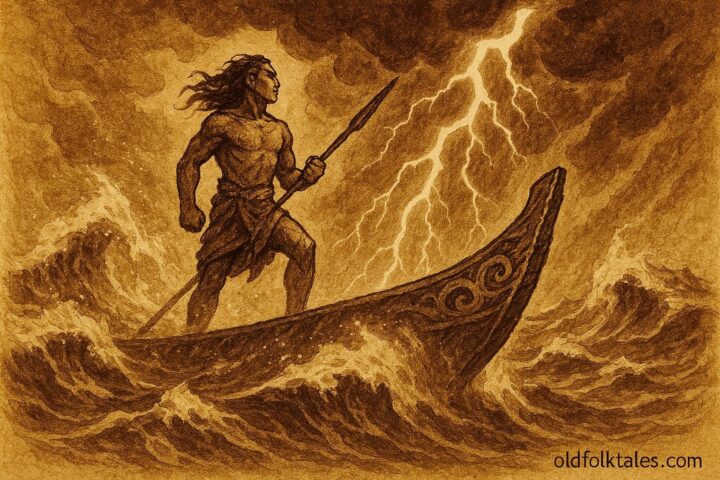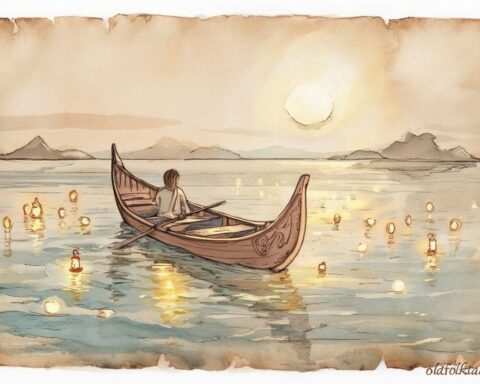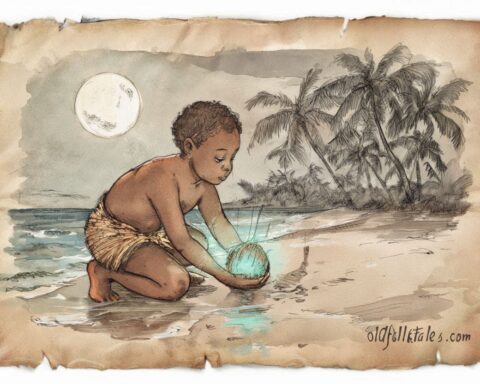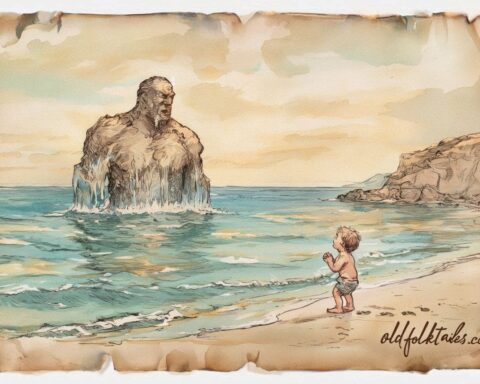Before the islands had clocks or shadows that kept steady, the days in old Hawai‘i were short as bird flights. The sun sped across the sky as if chased by wind, and no one could work, fish, or weave before night swallowed their light.
The people prayed to the spirits of the mountain, but the sun—La, fiery and proud—never listened. “I am too strong to slow for mortals,” it blazed. “The sky is mine alone.”
But one youth would not bow to that pride. His name was Māui-tikitiki-a-Taranga, the youngest son of a goddess and the cleverest under the heavens.
When his mother, Hina, spread kapa cloth to dry and found it still damp at dusk, she sighed. “The sun steals my hours,” she said. “It runs too fast.”
Māui, who loved his mother more than comfort, clenched his fists. “Then I’ll make it walk, not run,” he said.
He gathered strong fiber from the hau tree, twisting it into a cord tougher than sharkskin. He smeared it with resin and whispered charms of restraint learned from his ancestors. Then he climbed the sacred mountain Haleakalā, the house of the sun, where dawn is born.
All through the night he waited, crouched in shadow. The earth trembled with the coming day. The first ray of dawn pierced the clouds like a spear—and Māui leapt!
He flung his rope toward the horizon. It caught the burning leg of La, who roared in fury and pain. “Who dares bind me?” thundered the sun.
“I am Māui of the people below,” the demigod shouted, holding fast. “You race too quickly. None can live or work by your haste!”
The sun thrashed, flinging sparks that burned Māui’s hands, but he did not let go. He drove stakes of stone into the mountain and looped the rope around them. Each time the sun pulled, the cords held.
La’s fire dimmed. Smoke coiled through the morning air. “Enough!” cried the sun. “You will tear me apart!”
“Then promise,” said Māui, his hair smoking but his eyes bright, “that you’ll move slower—half your pace—and share your warmth with the people of the earth.”
The sun, weakened but wise enough to see the courage before him, agreed. “I will keep my promise,” it said. “But know, trickster, that your hands will always bear my mark.”
When Māui released the ropes, La crawled across the sky slowly, gently. The day stretched longer than ever before.
When Māui returned to his village, Hina’s kapa cloths were dry, the fishermen had returned with full nets, and the people danced under a sun that no longer fled.
Since then, the people of the Pacific say the days of summer are long because Māui once lassoed the sun and taught it to listen.
And every morning, when the first light touches Haleakalā, it moves slow enough to remember that one small being’s courage changed the rhythm of heaven itself.
Moral of the Story
Even the greatest forces yield to courage guided by compassion. True strength is not in defeating nature but in persuading it to care for those it forgets.
Knowledge Check
1. Why were the people unhappy with the sun?
Because it moved too fast across the sky, leaving little daylight for work or living.
2. Who decided to stop the sun?
Māui, the demigod known for cleverness and courage.
3. How did Māui catch the sun?
He climbed Haleakalā and used ropes made from hau fiber to snare the sun’s legs.
4. What did the sun promise in exchange for freedom?
To slow its pace and share longer daylight with the people.
5. What happened after Māui’s victory?
The people rejoiced, able to fish, weave, and live under longer daylight.
6. What lasting mark did Māui receive?
Burned hands—a symbol of his sacrifice and triumph.
Origin: Hawaiian and wider Polynesian oral traditions






